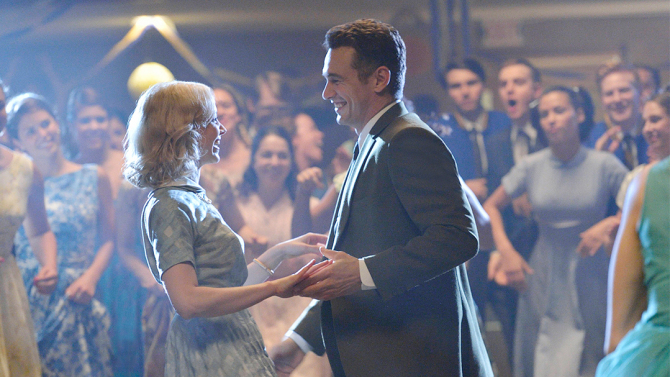One of the most notable things about Hulu’s miniseries 11.22.63 is that, despite having never read the book that it is based on, I can still tell that it is exceptionally true to its source material. Author Stephen King has a very distinct narrative style, predicated on introducing a clever idea and then letting it take him wherever he deems the most interesting. His best stories live in the moment, guided only by the faint and distant light of a Macguffin device. The problem he tends to have is that, when it comes time to actually catch up with his Macguffin, he doesn’t quite know what to do with it.
This is the case with 11.22.63. It’s a story about time travel with a unique set of “rules:” one can only go back to a particular date in 1960, whatever changes you make apply to the world when you return to the future, and re-entering the past wipes your previous changes. Also, when somebody tries to make changes to the past that will significantly alter the course of history, “the past,” a vaguely-defined mystical force, will fight back and try to stop it. It’s a fantastic and relatively unique take on time-travel, adding an almost video-game like element to the goal Jake Epping (James Franco) takes on: at any time, he can “wipe” his progress by returning to the future and starting over.
While the series never takes direct advantage of the “wiping” device, the fact that it exists lends a certain menace to Epping that would not exist otherwise. Because he could theoretically go back and start over again at any point, all of the lost lives and terrible events that occur because of his actions are essentially being passed over as acceptable losses. I kept waiting for him to mess something up so spectacularly that he would have to begin again, but he keeps soldiering on.
The Macguffin here, as the titular date would indicate, is to stop John F Kennedy from being assassinated. This plot device is never forgotten, and does lead to much of the show’s conflict as Epping has to balance his 1960s life with his “mission.” But for six of its eight episodes, this is the primary purpose of the assassination plot: to add conflict and secrecy to a story about a modern man living in the 1960s. Jake and his eventual partner Bill painstakingly track Lee Harvey Oswald and investigate the possibility of a conspiracy or a second shooter, but they never really discover anything that affects the mission itself. Instead, Bill becomes entangled in Oswald’s life, and Epping’s criticism of Bill’s off-mission indiscretions spotlights his own hypocrisy regarding his relationship with his fellow (technically married) teacher, Sadie Dunhill.
These six episodes work beautifully on a script level and are elevated further by the performances and production values. Hulu bet big on 11.22.63, and it shows. The series is utterly gorgeous, with stunning cinematography, brilliant lighting, and uniformly strong editing. From start to finish, the series rivals anything on premium cable in pure craftsmanship.
Like most of King’s work, though, it does run into some trouble once the Macguffin takes over the story. Episode 7 is particularly strange, trying to pass over months of time while not actually progressing the story significantly. It relies on an amnesia subplot (one apparently adapted from the book) which manages only to stall the narrative for the week and, like most amnesia devices, is far too easily overcome. It seems like the show just needed to kill some time before its big finale but, after actually seeing the finale, I wish they had taken the opportunity to stretch some of the events to give them time to breathe.
Don’t get me wrong, lots of interesting stuff happens in the final episode, and I was never bored by it. However, like the previous episode, far too many conflicts are resolved too quickly or are never given their proper weight. The most egregious examples are when Epping is immediately released from police custody, and his decision about what to do with Sadie. In the former case it’s simply too convenient, and in the latter the character takes another character’s word on something rather than seeing for himself.
Both moments feel like situations in which there simply wasn’t enough time to fully pay things off, but had the assassination attempt been dealt with in episode 7, with the finale dealing solely with the aftermath, I feel like there could have been a stronger payoff. Still, 11.22.63’s final scene feels appropriate. The plot and the series itself has shrugged off its advertised premise by this point, simply leaving us with a moment of reconnection between two characters who care about each other.
And so, 11.22.63 isn’t perfect. Some plotlines are stretched too thin, others aren’t explored as much as they should be, and the “mission” is never much more than a Macguffin. But it’s a series full of charm and intrigue, one that is far more successful than not in its moment-to-moment storytelling. In short, it’s a Stephen King story, with all of the wonder and baggage that entails.
